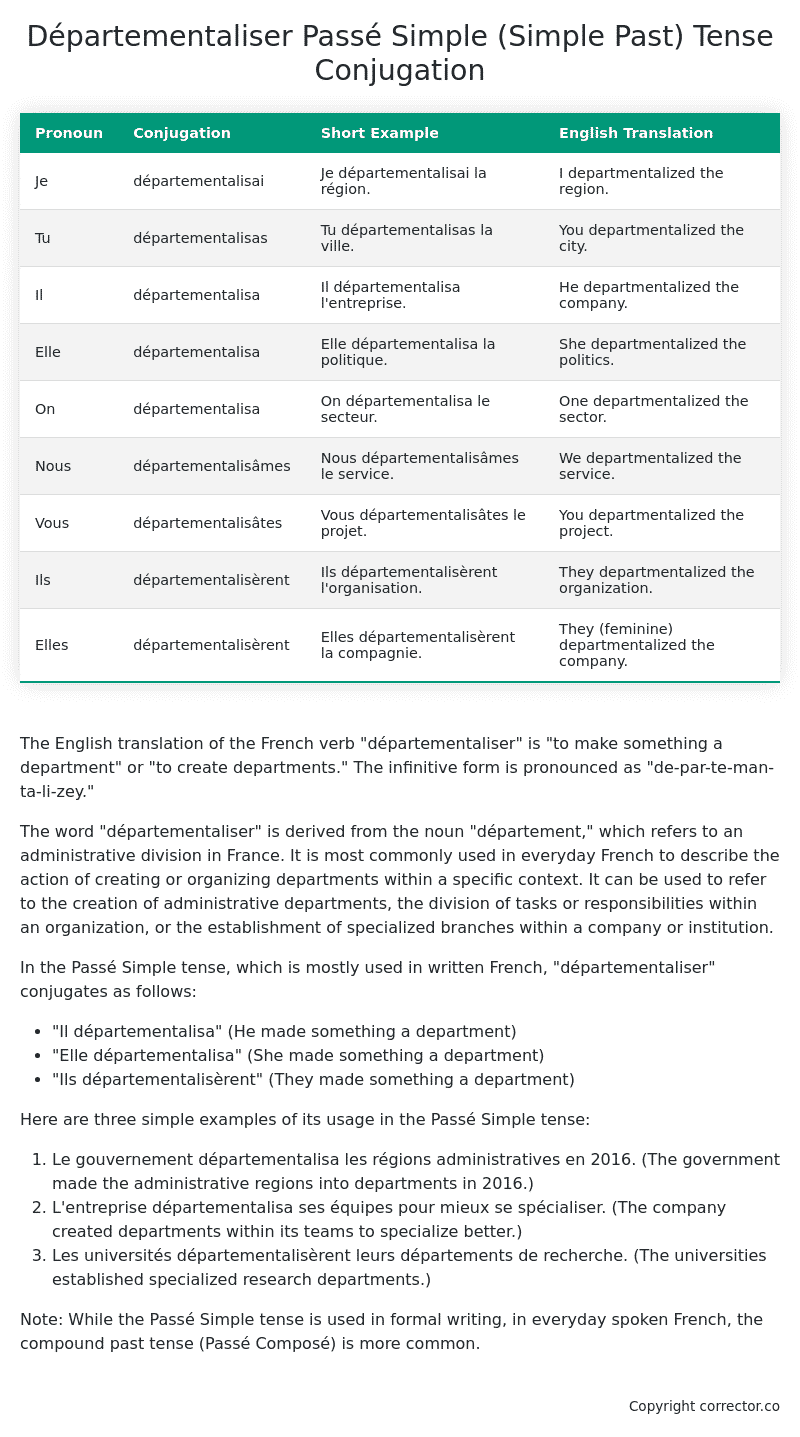Passé Simple (Simple Past) Tense Conjugation of the French Verb départementaliser
Introduction to the verb départementaliser
The English translation of the French verb “départementaliser” is “to make something a department” or “to create departments.” The infinitive form is pronounced as “de-par-te-man-ta-li-zey.”
The word “départementaliser” is derived from the noun “département,” which refers to an administrative division in France. It is most commonly used in everyday French to describe the action of creating or organizing departments within a specific context. It can be used to refer to the creation of administrative departments, the division of tasks or responsibilities within an organization, or the establishment of specialized branches within a company or institution.
In the Passé Simple tense, which is mostly used in written French, “départementaliser” conjugates as follows:
- “Il départementalisa” (He made something a department)
- “Elle départementalisa” (She made something a department)
- “Ils départementalisèrent” (They made something a department)
Here are three simple examples of its usage in the Passé Simple tense:
- Le gouvernement départementalisa les régions administratives en 2016.
(The government made the administrative regions into departments in 2016.) - L’entreprise départementalisa ses équipes pour mieux se spécialiser.
(The company created departments within its teams to specialize better.) - Les universités départementalisèrent leurs départements de recherche.
(The universities established specialized research departments.)
Note: While the Passé Simple tense is used in formal writing, in everyday spoken French, the compound past tense (Passé Composé) is more common.
Table of the Passé Simple (Simple Past) Tense Conjugation of départementaliser
| Pronoun | Conjugation | Short Example | English Translation |
|---|---|---|---|
| Je | départementalisai | Je départementalisai la région. | I departmentalized the region. |
| Tu | départementalisas | Tu départementalisas la ville. | You departmentalized the city. |
| Il | départementalisa | Il départementalisa l’entreprise. | He departmentalized the company. |
| Elle | départementalisa | Elle départementalisa la politique. | She departmentalized the politics. |
| On | départementalisa | On départementalisa le secteur. | One departmentalized the sector. |
| Nous | départementalisâmes | Nous départementalisâmes le service. | We departmentalized the service. |
| Vous | départementalisâtes | Vous départementalisâtes le projet. | You departmentalized the project. |
| Ils | départementalisèrent | Ils départementalisèrent l’organisation. | They departmentalized the organization. |
| Elles | départementalisèrent | Elles départementalisèrent la compagnie. | They (feminine) departmentalized the company. |
Other Conjugations for Départementaliser.
Le Present (Present Tense) Conjugation of the French Verb départementaliser
Imparfait (Imperfect) Tense Conjugation of the French Verb départementaliser
Passé Simple (Simple Past) Tense Conjugation of the French Verb départementaliser (You’re reading it right now!)
Passé Composé (Present Perfect) Tense Conjugation of the French Verb départementaliser
Futur Simple (Simple Future) Tense Conjugation of the French Verb départementaliser
Futur Proche (Near Future) Tense Conjugation of the French Verb départementaliser
Plus-que-parfait (Pluperfect) Tense Conjugation of the French Verb départementaliser
Passé Antérieur (Past Anterior) Tense Conjugation of the French Verb départementaliser
Futur Antérieur (Future Anterior) Tense Conjugation of the French Verb départementaliser
Subjonctif Présent (Subjunctive Present) Tense Conjugation of the French Verb départementaliser
Subjonctif Passé (Subjunctive Past) Tense Conjugation of the French Verb départementaliser
Subjonctif Imparfait (Subjunctive Imperfect) Tense Conjugation of the French Verb départementaliser
Conditionnel Présent (Conditional Present) Tense Conjugation of the French Verb départementaliser
Conditionnel Passé (Conditional Past) Tense Conjugation of the French Verb départementaliser
Conditionnel Passé II (Conditional Past II) Tense Conjugation of the French Verb départementaliser
L’impératif Présent (Imperative Present) Tense Conjugation of the French Verb départementaliser
L’impératif Passé (Imperative Past) Tense Conjugation of the French Verb départementaliser
L’infinitif Présent (Infinitive Present) Tense Conjugation of the French Verb départementaliser
L’infinitif Passé (Infinitive Past) Tense Conjugation of the French Verb départementaliser
Le Participe Présent (Present Participle) Tense Conjugation of the French Verb départementaliser
Le Participe Passé (Past Participle) Tense Conjugation of the French Verb départementaliser
Struggling with French verbs or the language in general? Why not use our free French Grammar Checker – no registration required!
Get a FREE Download Study Sheet of this Conjugation 🔥
Simply right click the image below, click “save image” and get your free reference for the départementaliser Passé Simple tense conjugation!

Départementaliser – About the French Passé Simple (Simple Past) Tense
Formation
Usage
Narration
Historical Context
Interactions with other tenses
Passé Composé
Imparfait
Conditional and Subjunctive
Summary
I hope you enjoyed this article on the verb départementaliser. Still in a learning mood? Check out another TOTALLY random French verb conjugation!


